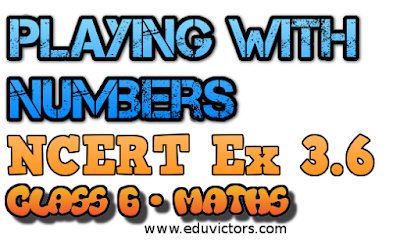Blog provides NCERT solutions, CBSE, NTSE, Olympiad study material, model test papers, important Questions and Answers asked in CBSE examinations. References to Educational Sites and resources.
Wednesday, 3 May 2017
Tuesday, 2 May 2017
CBSE Class 6 Maths - Playing With Numbers - NCERT Exercise 3.6 (#cbsenotes)
Playing With Numbers
EXERCISE 3.6
CBSE Class 6 Maths
Q1: Find the HCF of the following numbers:
(a) 18, 48
(b) 30, 42
(c) 18, 60
(d) 27, 63
(e) 36, 84
(f) 34, 102
(g) 70, 105, 175
(h) 91, 112, 49
(i) 18, 54, 81
(j) 12, 45, 75
Answer:
(a) Factors of 18 = 2 × 3 × 3
Factors of 48 = 2 × 2 × 2 × 2 × 3
HCF (18, 48) = 2 × 3 = 6
(b) Factors of 30 = 2 × 3 × 5
Factors of 42 = 2 × 3 × 7
HCF (30, 42) = 2 × 3 = 6
(c) Factors of 18 = 2 × 3 × 3
Factors of 60 = 2 × 2 × 3 × 5
HCF (18, 60) = 2 × 3 = 6

Monday, 1 May 2017
Sunday, 30 April 2017
CBSE Class 10 - Physics - Electricity - Important Points To Remember (#cbsenotes)
Electricity - Important Points To Remember
CBSE Class 10 - Physics
① Electric current is defined as the amount of charge flowing through a particular cross section area in a unit time.
② The SI unit of electric current is ampere.
③ A stream of electrons moving through a conductor constitutes an electric current. In a conventional current, the direction of current is taken opposite to the direction of flow of electrons i.e. flow of positive charges from +ve terminal to -ve terminal.
④ 1 A is the flow of 6.25 × 10¹⁸ electrons per second, or 1 coulomb per second.

Saturday, 29 April 2017
CBSE Class 6 Maths - Playing With Numbers - NCERT Exercise 3.5 (#cbsenotes)
Playing With Numbers
EXERCISE 3.5
CBSE Class 6 Maths
Q1: Which of the following statements are true?
(a) If a number is divisible by 3, it must be divisible by 9.
(b) If a number is divisible by 9, it must be divisible by 3.
(c) A number is divisible by 18, if it is divisible by both 3 and 6.
(d) If a number is divisible by 9 and 10 both, then it must be divisible by 90.
(e) If two numbers are co-primes, at least one of them must be prime.
(f) All numbers which are divisible by 4 must also be divisible by 8.
(g) All numbers which are divisible by 8 must also be divisible by 4.
(h) If a number exactly divides two numbers separately, it must exactly divide their sum.
(i) If a number exactly divides the sum of two numbers, it must exactly divide the two numbers separately.
Answer:
(a) ✗ (e.g. 15 is divisible by 3 but not by 9)
(b) ✔
(c) ✔
(d) ✔
(e) ✗ (e.g. 8 and 9 are co-primes and none of these are prime. )
(f) ✗
(g) ✔
(h) ✔
(i) ✗
Q2: Here are two different factor trees for 60. Write the missing numbers.

Friday, 28 April 2017
CBSE Class 9 - Science - Unit Test Paper (2017-18) (#cbsepapers)
CBSE Class 9 - Science Unit Test Paper (2017-18)
Chapters Covered In Unit Paper:1. Straight Line Motion
2. Cell - Fundamental Unit Of Life
3. Matter and Its Surroundings

Thursday, 27 April 2017
CBSE Class 11/12, AIPMT/NEET - Biology - List of Important Proteins and Their Occurrence (#cbsenotes)(#biologynotes)
List of Important Proteins and Their Occurrence
| Protein | Found Where |
|---|---|
| Albumin | Egg White, Milk, Blood Plasma |
| Actin | Muscle Fibres (Contractile protein) |
| Collagen | Tendon, Bones |
| Casein | Milk, Egg Yolk |
| Keratin | Hair, Horn, feathers, Nail |
| Cytochrome | Mitochondria |
| Elastin | Arteries, Ligaments,Yellow Fibres |

Subscribe to:
Comments (Atom)

